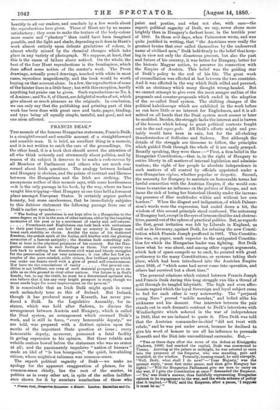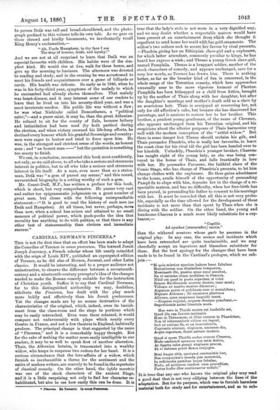FRANCIS DEAK.* THIS memoir of the famous Hungarian statesman, Francis
Deik, is a straightforward and sensible account of a straightforward and sensible man. It is brief, an excellent thing in a memoir, and it is not written to catch the ears of the groundlings. On the other hand, it is a book that should arrest the attention of
all who think seriously and strenuously about politics, and by reason of its subject it deserves to be made a vade-mecum by all Members of Parliament and others who are much con-
cerned about Irish questions. The analogy between Ireland and Hungary is obvious, and the points of contrast and likeness between the Hungarians and the Irish are striking. The anonymous author of this memoir says, with some heedlessness —it is the only passage in his book, by the way, where we have caught him tripping—that Hungary at one time held a foremost place amongst European States. It certainly argues perfect honesty, but some carelessness, that he immediately subjoins to this dubious statement the following passage from one of Desk's earlier speeches
" The feeling of patriotism is not kept alive in a Hungarian to the same degree as it is in the men of other nations, either by the inspiring memories of the past or by a sentiment of vanity and self-esteem.
Frenchmen and Englishmen can look back with enthusiasm to their past history, and can feel that no country in Europe can boast such stability as theirs. Amidst the ruins of his shattered freedom, the ardent spirit of the Italian still kindles with the glowing memories of a famous antiquity; the Russian finds something sub- lime at least in the physical greatness of his country. But the Hun- garian cannot share in such feelings as these. Our country can look back to nothing but disastrous civil wars and bloody struggles for the preservation of our very existence ; it can offer but few ex- amples of the pure-minded, noble citizen, few brilliant pages which can make our hearts swell with a glow of proud self-consciousness.
Nor have we the consolations of vanity Our present con- dition is not brilliant, nor even of such material prosperity as to en- able us on this ground to rival other nations. Our future is in God's hands; but, to say the truth, he must be a determined optimist who can believe that it has any very bright prospect in store, though we must needs hope for some improvement on the present."
It is conceivable that an Irish Defik might speak in some
such melancholy tone as this of Ireland. But Ireland, though it has produced many a Kossuth, has never pro- duced a Defik. In the Legislative Assembly, for in- stance, which was hold after Sadowa, to discuss the arrangement between Austria and Hungary, which is called the Dual system, an arrangement which crowned Defik's work, and is still in force, " every honourable deputy," we are told, was prepared with a distinct opinion upon the merits of the important State question at issue ; every honourable deputy, moreover, possessed a fatal facility in giving expression to his opinion. But these voluble and
volatile orators bowed before the statesman who was no orator at all ; and the passionately impulsive "nation of hussars" made an idol of " le bon bourgeois," the quiet, law-abiding
citizen, whose mightiest talisman was common-sense.
The superb political sagacity of. De4k we make no apology for the apparent exaggeration of phrase, for in common-sense chiefly, lies the root of the matter, in
politics as in every other art, in spite of the sullen indiffer- ence shown for it by numbers numberless of those who • Fra*s.s //Mk, Hieerwiea Blakeman: a Moak. Louden: klaerallIsaasul Os.
paint and poetise, and what not else, with ease—the superb political sagacity of Defik, we say, never shone more brightly than in Hungary's darkest hour, in the terrible year of 1849. In those evil days, when Palmerston wrote, and was quite justified in writing, that " the Austrians were really the greatest brutes that ever called themselves by the undeserved name of civilised men," Defik held firmly to the belief that keep- ing in view not only the disastrous present, but also the past and future of his country, it was better for Hungary, better for the historic Magyar nation, to preserve its connection with the Empire of Austria. This belief was the guiding star of Deik's policy to the end of his life. The great work of reconciliation was effected at last between the two countries. And it was effected in the way which Defik willed and pursued, with an obstinacy which many thought wrong-headed. But we cannot attempt to give even the most meagre outline of the proposals and counter-proposals which ended in the adoption of the so-called Dual system. The shifting changes of the political kaleidoscope which are exhibited in the work before us can have little or no interest for Englishmen, and it is ad- mitted on all hands that the Dual system must sooner or later be modified. Besides, the struggle lacks the interest and is barren of the lessons which belong to great political contests fought out to the end aquo pede. All Defik's efforts might and pro- bably would have been in vain, but for the all-shaking thunderstrokes of Solferino and Sadowa. But although the details of the struggle are tiresome to follow, the principles which guided Defik through the whole of it are easily grasped.
Broadly speaking, they were these :—" First, a firm belief in the Hungarian Constitution,—that is, in the right of Hungary to entire liberty in all matters of internal legislation and adminis- tration; the right of her people to absolute independence in such matters of all control by officials appointed under a non-Hungarian regime, whether popular or despotic. Second, the necessity for Hungary to maintain on honourable terms her lawful connection with the Austrian Empire, if she would con- tinue to exercise an influence on the politics of Europe, and not incur the risk of losing her historical identity under the increas- ing pressure of Slav multitudes within and without her own
borders." When the disgust and indignation, of which Palmer- ston's words were the expression, had cooled down a bit, the wisdom of this second principle stood confessed. The autonomy of Hungary had, except in the eyes of irreconcileables and obstruc- tires, passed out of the sphere of practical politics. But, as regards the first, great irritation was felt by Liberals in England, as well as in Germany, against Deak, for refusing the new Consti- tution which Francis Joseph proffered in 1861. This Constitu- tion was, on paper, much superior to the antiquated Constitu- tion for which the Hungarian leader was fighting. But Defik knew what be was about, and among other cogent arguments, which lack of space compels us to omit, he pointed with great pertinency to the many Constitutions, or systems taking their place, which had been introduced into the Austrian Empire since 1848, of "which some had never come into operation, and others had survived but a short time."
The personal relations which existed between Francis Joseph and Francis Defik daring this long struggle run like a thread of gold through its tangled labyrinth. The high and even affec- tionate regard which the loyal Sovereign and loyal subject came to feel for each other is very noteworthy. The " perjured young Nero " proved " nobile mendax," and belied alike his nickname and his descent. One interview between the pair stands out in such dramatic contrast to Defik's interviews with Windischgriitz which ushered in the war of independence
in 1849, that we are induced to quote it. Then Defik was told that the Austrian commander-in-chief "did not treat with rebels," and he was put under arrest, because he declined to give his word of honour to use all his influence to persuade Kossuth and the Diet into unconditional surrender. But,— "Two or three days after the news of the defeat at ICOniggritz (Sadowa, 1866) had reached the capital, Beak was summoned to Vienna. Arriving at the palace at midnight, he was ushered at once into the presence of the Emperor, who was standing, pale and troubled, at the window. Presently, turning round, he said abruptly, 'Well, Deiik, what shall I do now? '= Your Majesty,' was the prompt reply, must first make peace, and then give Hungary her rights.'—' Will the Hungarian Parliament give me men to carry on the war, if I give the Constitution at once ?' demanded the Emperor. —' No,' was De4k's answer, thus faithfully representing Hungarian opinion in its repugnance to the war, and the whole scheme of policy that it implied.—' Well,' said the Emperor, after a pause, I suppose it must be so.' "
In person Defik was tall and broad-shouldered, and the photo- graph prefixed to this volume tells its own tale. As we gaze on those shrewd and kindly lineaments, we involuntarily recall King Henry's exclamation,—
" Ah, Uncle Humphrey, in thy face I see
The map of honour, truth, and loyalty!"
And we are not at all surprised to learn. that Deirk was an especial favourite with children. His habits were of the sim- plest kind. He would rise at five, walk for three hours, and give up the morning to business. The afternoon was devoted to reading and study, and in the evening he was accustomed to meet his friends and acquaintances over a game of billiards or cards. His health was delicate. So early as in 1846, when he was in his forty-third year, symptoms of the malady to which he succumbed had already shown themselves. That malady was heart-disease, and it may interest some of our readers to learn that he lived on into his seventy-third year, and was a most inveterate smoker. His public life was without a flaw; he was what Niehbuhr called Demosthenes, a "political saint,"—and a purer saint, it may be, than the great Athenian. He refused to sit for the county of Zala, because bribery and intimidation had been used (by both parties) during the election, and when victory crowned his life-long efforts, he declined every honour which his grateful Sovereign and country- men were eager to bestow and tried to force upon him. He was, in the strongest and strictest sense of the words, an honest man ; and " an honest man —" but the quotation is something too musty to finish.
We can, in conclusion, recommend this book most confidently, not only, as we said above, to all who take a serious and strenuous interest in politics, but to all who take a serious and strenuous interest in life itself. As a man, even more than as a states- man, Delik was " a gem of purest ray serene," and this round, unvarnished biography is a setting worthy of such a gem.
Mr. Grant-Duff, M.P., has written a preface for this book, which is short, but very comprehensive. He passes very curt and rather too epigrammatic judgments on a great number of great men, but closes with the following unimpeachable statement :—" It is good to read the history of such men (as Desk and Hampden). At all times, but never, perhaps, more than now, when a school has arisen and attained to no small measure of political power, which pooh-poohs the idea that morality has anything to do with politics, or that there is any other test of statesmanship than obvious and immediate success."































 Previous page
Previous page